[KIDP Ulsan] “Promoting Exemplary Cases of Social Upcycling”
[KIDP Ulsan] “Promoting Exemplary Cases of Social Upcycling”
Posted June. 21, 2024 09:50,
Updated August. 30, 2024 10:11
[IT DongA x Ulsan City x Design-driven Manufacturing Innovation Center] The Korea Institute of Design Promotion(KIDP) has set up the 'Ulsan Design-driven Manufacturing Innovation Center' at the University of Ulsan. The center helps promising SMEs and startups in the region strengthen their design competitiveness. IT DongA introduces companies selected for the 'Design-driven Manufacturing Innovation Support Project' and supports their efforts to expand.
It is said that Ulsan's ancient name was 'Usisan-guk.' This historical reference inspired Byun Eui-hyun, CEO of Usisan, to name his social upcycling enterprise. Usisan, rooted in Ulsan city, signifies that while the company may have begun on a modest scale, its aspirations are as grand as a mountain: to evolve into a large-scale enterprise.
Usisan is dedicated to upcycling, utilizing materials that would otherwise be discarded and transforming them into products with new value. The company primarily focuses on PET plastic bottles, commonly referred to as 'PET bottles.' These bottles are processed into cotton and fibers, which are then used to create dolls, towels, gloves, bags, and various other miscellaneous goods.
 CEO Byun Eui-hyun (third from left) introduces his company./ Source: IT DongA
CEO Byun Eui-hyun (third from left) introduces his company./ Source: IT DongA
Usisan infuses the story and charm of Ulsan into its upcycled goods. Their cute character, a whale symbolizing Ulsan, not only represents the city but also conveys a message about the suffering of whales due to environmental pollution and marine debris. This message is communicated to consumers through various means such as storybooks, characters, banners, and experiential spaces.
You can encounter Usisan at the Ulsan Museum and the Whale Museum in Jangsaengpo, Ulsan. Additionally, Usisan's whale-themed products are available at 22 highway rest stops nationwide and at a convenience store in Yongsan Station, Seoul. Beginning with whale protection, the company aims to establish itself as a leading social upcycling enterprise that advocates for the protection of both people and the environment.
From café to cultural space to upcycling base, one step at a time.
Founded by Byun, Usisan initially served as a café where middle-aged and elderly individuals were employed. However, he recognized that the connection between social enterprise and café culture was somewhat weak. Consequently, he conceived the idea of incorporating a space for showcasing cultural goods into Usisan's business premises. It was during this period that he experienced the influential power of culture and the growing popularity of well-crafted small items. As a result, Usisan evolved into a company producing items adorned with whale designs.
 CEO Byun explains Usisan's products and their planning intentions / Source: IT DongA
CEO Byun explains Usisan's products and their planning intentions / Source: IT DongA
While collaborating with middle-aged and elderly residents in Ulsan to deliver cultural works, Usisan was acknowledged as an exemplary local community enterprise. Following its expansion to Jangsaengpo, Ulsan, Usisan transitioned into a tourism venture company, leveraging merchandise and cultural artworks adorned with whale designs to develop travel souvenirs. Subsequently, it became aware of the distressing reality regarding whales, specifically the issue of mistakenly ingesting discarded ocean plastics and facing mortality.
CEO Byeon Ui-hyeon was determined to address this issue, raising awareness about the tragedy facing whales, which are symbols of Ulsan and familiar to consumers. An opportunity arose when large corporations dedicated to environmental protection, international organizations, and government agencies came to Ulsan. They have entered into a business agreement to collect and process marine plastic waste to save whales. Usisan also participated in this initiative.
Usisan was tasked with processing marine plastic waste. In the first place, CEO Byun focused on researching the technology to process the most abundant type of marine plastic waste, PET bottles, into cotton and thread. After an extensive search across the nation, Usisan successfully secured both the PET bottle upcycling technology and a network of companies. Recognized for this accomplishment, Usisan was also chosen to participate in the Korean version of the New Deal project.
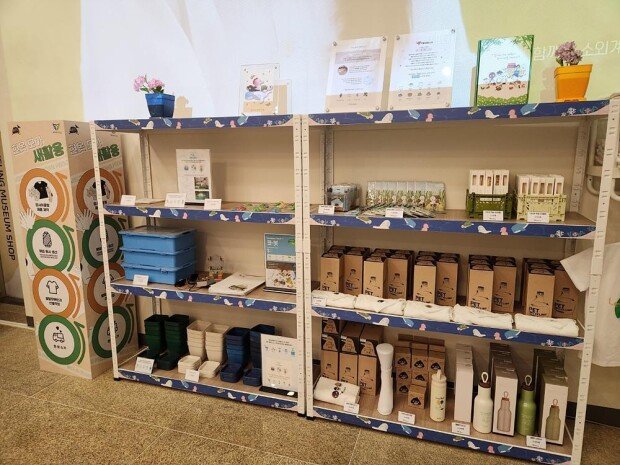 Usisan produces various upcycled products. / Source: IT DongA
Usisan produces various upcycled products. / Source: IT DongA
Usisan subsequently refined its PET bottle upcycling technology. Although successful in developing prototypes, the complexity of the process made it challenging to reduce product costs. Byun's approach centered on mass production and fulfilling bulk orders from corporations for upcycled products. The creation of whale-themed products, symbolizing the identity of Ulsan, proved effective. As awareness of the environmental message and the charm of the character embedded in Usisan's products grew, more companies began seeking Usisan, contributing to consistent revenue growth.
Navigating the COVID-19 pandemic crisis with the help of consumers and partners
During the COVID-19 pandemic crisis, Usisan faced significant challenges. All Usisan stores, including those located in Ulsan's Jangsaengpo tourist area, were closed, and B2B product orders and online store sales came to a halt. CEO Byun Eui-hyun recalls a time when they recorded zero monthly revenue. Instead of storing away their products during this time, they opted to donate them to childcare facilities in the areas of Daegu and Gyeongbuk. This initiative aimed to bring comfort to disadvantaged children amidst widespread hardship.
 CEO Byun Eui-hyun displays an eco-friendly banner crafted from 100% domestic PET bottle waste./ Source: Usisan
CEO Byun Eui-hyun displays an eco-friendly banner crafted from 100% domestic PET bottle waste./ Source: Usisan
This marked a significant turning point for Usisan. Amidst the challenging times of the COVID-19 pandemic, the company was recognized as a "Social Value Avengers" company, dedicated to upholding social values. At a time when major corporations were actively pursuing meaningful social contribution initiatives, they turned to Usisan and proposed funding the company to increase its production of goods for donation throughout society. Concurrently, it launched a crowdfunding campaign to mitigate the impact of the COVID-19 pandemic on Ulsan. Remarkably, not only did the campaign succeed, but it also led to a follow-up crowdfunding campaign.
This opportunity paved the way for Usisan's expansion overseas. While active abroad, a Korean idol group introduced Usisan's products, sparking demand overseas. The Korea Tourism Organization took notice and facilitated Usisan's product exportation abroad. CEO Byun mentions that they were able to recover sales thanks to this.
After overcoming the crisis, Usisan promptly initiated social contribution activities for both consumers and partner companies. One such initiative focuses on job creation and education for young people and the underprivileged. Usisan collaborates with young individuals to brainstorm product ideas and employs middle-aged and vulnerable individuals to manufacture these goods. The profits generated from this endeavor are consistently donated. Through this initiative, Usisan has established partnerships with disability welfare organizations. Most recently, they have partnered to develop Usisan factories in Busan and Daegu, with the objective of providing employment opportunities for people with disabilities.
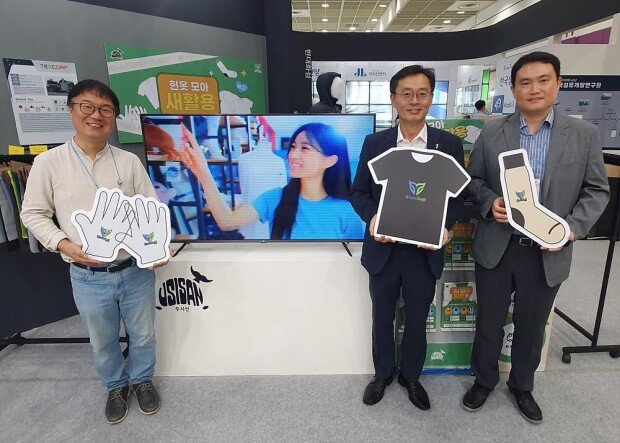 CEO Byun presents the "Used Clothes Recycling Project' alongside Ho Yoseung, President of the Korea Textile Development Institute, and Park Junsu, Team Leader (from left) at the Preview in SEOUL (PIS) exhibition. /Source: Usisan
CEO Byun presents the "Used Clothes Recycling Project' alongside Ho Yoseung, President of the Korea Textile Development Institute, and Park Junsu, Team Leader (from left) at the Preview in SEOUL (PIS) exhibition. /Source: Usisan
As part of its social contribution activities for partner companies, Usisan has devised ways to refine and enhance recycling technologies to create a variety of products from diverse resources. This approach stems from the need to deliver multiple values to more consumers and to tailor responses to the demands and traits of partner companies. Additionally, Usisan is engaged in activities for its hometown of Ulsan. It aims to preserve the gray whales, a natural monument in Jangsaengpo, Ulsan, and spread the message of living together harmoniously.
SK Group, Hyundai Motor Company, Korea Occupational Safety and Health Agency, and Korea Railroad Corporation are among the robust corporate and institutional partners secured by Usisan.
Engaged in various social contribution activities, Usisan has attracted strong partners from both the corporate and institutional sectors. Among these, SK Group, renowned for its active ESG initiatives, stands out as Usisan's largest partner. They collaborate across the business spectrum, including product development, distribution, and sales. Starbucks has also entrusted Usisan with product development, such as creating coffee bean packaging pouches. Additionally, Usisan has partnered with NGOs like Save the Children, Good Neighbors, and various environmental foundations. While their initial focus was on ocean and whale preservation, their efforts now also address children's rights and climate change.
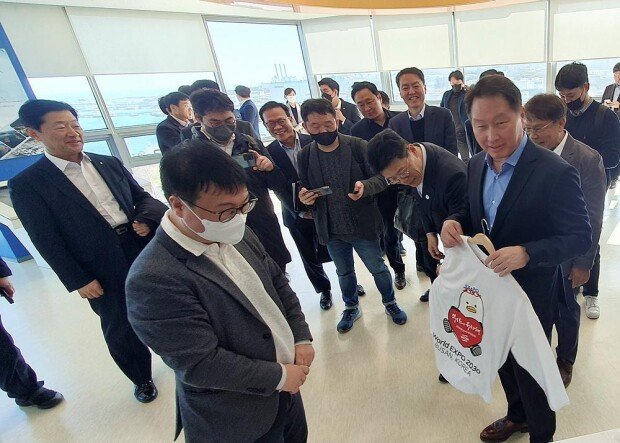 CEO Byun (bottom) presents the plastic upcycling project to Chey Tae-won, Chairman of the Korea Chamber of Commerce and Industry (holding a shirt), during his visit to Jangsaengpo in Ulsan, South Korea. / Source: Usisan
CEO Byun (bottom) presents the plastic upcycling project to Chey Tae-won, Chairman of the Korea Chamber of Commerce and Industry (holding a shirt), during his visit to Jangsaengpo in Ulsan, South Korea. / Source: Usisan
Government agencies also collaborate with Usisan on social contribution activities. The Korea Railroad Corporation and the Korea Expressway Corporation collect plastic bottles from railways and roads, which are then upcycled in partnership with Usisan. Additionally, the Korea Occupational Safety and Health Agency works with Usisan to upcycle 500,000 discarded safety helmets annually.
CEO Byun regards the Ulsan Design-driven Manufacturing Innovation Center of the Korea Institute of Design Promotion as one of Usisan's most valuable partners. With their assistance, Usisan has significantly enhanced its product design and engineering capabilities, enabling the creation of more aesthetically pleasing upcycled materials.
One notable outcome of the collaboration is the redesigned recycling bin. The previous version, while functional, was plain. The Ulsan Design-driven Manufacturing Innovation Center recommended refining the bin's appearance and structure to better communicate its social mission and practical utility to consumers. Usisan consulted with partnering design firms and swiftly implemented their suggestions. They added prominent labels indicating the bin's usage areas and instructions, and designed the body to be detachable, reducing its volume by 30% and making it easier to ship.
 Usisan’s recycling bins created with the support of Ulsan Design-driven Manufacturing Innovation Center/ Source: IT DongA
Usisan’s recycling bins created with the support of Ulsan Design-driven Manufacturing Innovation Center/ Source: IT DongA
The impact was substantial, leading to orders from government agencies such as the Korea Workers' Compensation and Welfare Service and the Korea Energy Agency. Building on this success, Usisan expanded its range of recycling bins to include those for PET bottles, milk cartons, and more.
R&D, funding and structural sustainability: critical challenges for Usisan
Research and development in upcycling technology, securing investment funds, and establishing a sustainable structure pose critical challenges for Usisan.
Despite experiencing steady growth, Byun acknowledges that one of the major obstacles to further advancement is attracting investment. Usisan has operated with minimal external funding thus far, but to advance its upcycling technology and product development, attracting investment is essential. This funding will be pivotal in stabilizing revenue and enhancing its capabilities as a social upcycling enterprise.
 In collaboration with Ulsan City, the Korea Occupational Safety and Health Agency, the Korea Railroad Corporation, and Hankuk Mold, Usisan is launching Korea's first project to produce safety equipment from discarded safety helmets. / Source=Usisan
In collaboration with Ulsan City, the Korea Occupational Safety and Health Agency, the Korea Railroad Corporation, and Hankuk Mold, Usisan is launching Korea's first project to produce safety equipment from discarded safety helmets. / Source=Usisan
Securing sustainable growth, a challenge for all social enterprises, is also a task that Usisan must address. CEO Byun has recently expanded the product range from general merchandise to include safety equipment such as helmets and gloves. These tools are essential for ensuring safety and carry significant social value as well, which is expected to enhance Usisan's sales potential.
Another technology aiming at ensuring Usisan's sustainable growth is a method to extract clean threads from used clothing, set to be commercialized by 2024.
This initiative is being pursued in collaboration with Korean textile companies such as Hyosung, Black Yak, and Hyungji. Initially, Usisan will introduce gloves and socks made from recycled clothing, with plans to extend the application of this technology to the entire apparel industry. What adds further significance to this initiative is that all production will be carried out exclusively by disabled workers.
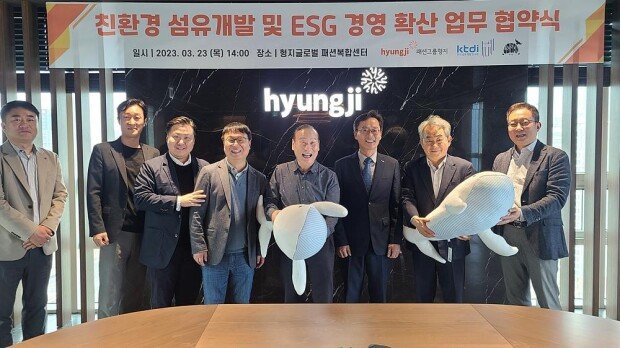 Usisan signs a business agreement for eco-friendly textile development with fashion group Hyungji and Korea Textile Development Institute./ Source= Usisan
Usisan signs a business agreement for eco-friendly textile development with fashion group Hyungji and Korea Textile Development Institute./ Source= Usisan
After refining their technology and expanding their product range to boost revenue and influence, Usisan is now tackling its next challenge: corporate expansion. While currently operating stores in various locations within Ulsan Metropolitan City, Usisan has also opened branches in nearby cities such as Daegu and Busan. With this scaling up phase, Usisan aims to establish a presence in the metropolitan areas, including Seoul, Incheon, and Gyeonggi Province, evolving into a social upscaling enterprise active nationwide.
Seeking to position itself as the foremost advocate for social upcycling, committed to the preservation of whales and the environment
CEO Byun Eui-hyun emphasizes that amidst the company's diverse ESG activities, his primary focus lies in ocean conservation. Therefore, Usisan continuously improves its ocean plastic recovery technology. In collaboration with the Korea Marine Environment Management Corporation under the Ministry of Oceans and Fisheries, the company actively engages in upcycling marine waste. This initiative involves collecting discarded items such as ropes and nets from the sea and creating new value from them.
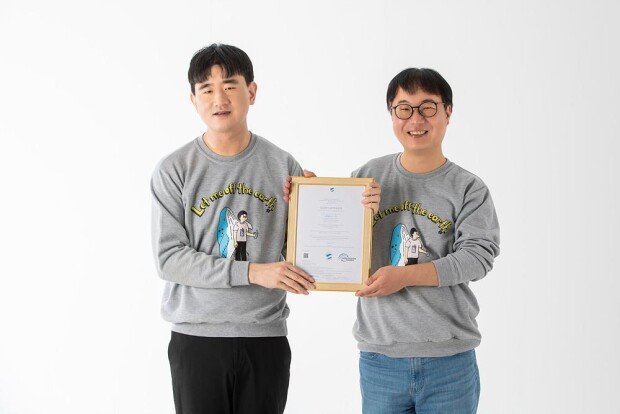 CEO Byun Eui-hyun (on the right) and Song Jong-gu, Usisan's in-house designer with developmental disabilities, display the GRS (Global Recycled Standard) certification./ Source: Usisan.
CEO Byun Eui-hyun (on the right) and Song Jong-gu, Usisan's in-house designer with developmental disabilities, display the GRS (Global Recycled Standard) certification./ Source: Usisan.
Usisan has already developed technology to process plastic components from discarded ropes into lightweight work caps, and gloves are produced in the same manner. Additionally, they are crafting attractive umbrellas from ocean plastics.
While acknowledging the inherent challenges of upcycling, Usisan remains steadfast in its commitment to generating new value through this process. Leveraging their refined technology and achievements, they aim to widely publicize positive examples of upcycling and spread awareness nationwide. Their ultimate goal is to become a company that saves not only the ocean and whales but also people and the environment.
 CEO Byun Eui-hyun introduces Usisan's upcycling technology and products/ Source=IT Donga
CEO Byun Eui-hyun introduces Usisan's upcycling technology and products/ Source=IT Donga
Byun stated, "Our goal is to establish Usisan as a prominent environmental enterprise in South Korea, recognized by all citizens. We are also dedicated to raising awareness of Usisan and our conservation endeavors among international consumers. Our aspiration is to set the standard for environmental businesses, inspiring others to follow our lead in the realm of social upcycling.”
BY Cha Ju-kyung (racingcar@itdonga.com)
It is said that Ulsan's ancient name was 'Usisan-guk.' This historical reference inspired Byun Eui-hyun, CEO of Usisan, to name his social upcycling enterprise. Usisan, rooted in Ulsan city, signifies that while the company may have begun on a modest scale, its aspirations are as grand as a mountain: to evolve into a large-scale enterprise.
Usisan is dedicated to upcycling, utilizing materials that would otherwise be discarded and transforming them into products with new value. The company primarily focuses on PET plastic bottles, commonly referred to as 'PET bottles.' These bottles are processed into cotton and fibers, which are then used to create dolls, towels, gloves, bags, and various other miscellaneous goods.

Usisan infuses the story and charm of Ulsan into its upcycled goods. Their cute character, a whale symbolizing Ulsan, not only represents the city but also conveys a message about the suffering of whales due to environmental pollution and marine debris. This message is communicated to consumers through various means such as storybooks, characters, banners, and experiential spaces.
You can encounter Usisan at the Ulsan Museum and the Whale Museum in Jangsaengpo, Ulsan. Additionally, Usisan's whale-themed products are available at 22 highway rest stops nationwide and at a convenience store in Yongsan Station, Seoul. Beginning with whale protection, the company aims to establish itself as a leading social upcycling enterprise that advocates for the protection of both people and the environment.
From café to cultural space to upcycling base, one step at a time.
Founded by Byun, Usisan initially served as a café where middle-aged and elderly individuals were employed. However, he recognized that the connection between social enterprise and café culture was somewhat weak. Consequently, he conceived the idea of incorporating a space for showcasing cultural goods into Usisan's business premises. It was during this period that he experienced the influential power of culture and the growing popularity of well-crafted small items. As a result, Usisan evolved into a company producing items adorned with whale designs.

While collaborating with middle-aged and elderly residents in Ulsan to deliver cultural works, Usisan was acknowledged as an exemplary local community enterprise. Following its expansion to Jangsaengpo, Ulsan, Usisan transitioned into a tourism venture company, leveraging merchandise and cultural artworks adorned with whale designs to develop travel souvenirs. Subsequently, it became aware of the distressing reality regarding whales, specifically the issue of mistakenly ingesting discarded ocean plastics and facing mortality.
CEO Byeon Ui-hyeon was determined to address this issue, raising awareness about the tragedy facing whales, which are symbols of Ulsan and familiar to consumers. An opportunity arose when large corporations dedicated to environmental protection, international organizations, and government agencies came to Ulsan. They have entered into a business agreement to collect and process marine plastic waste to save whales. Usisan also participated in this initiative.
Usisan was tasked with processing marine plastic waste. In the first place, CEO Byun focused on researching the technology to process the most abundant type of marine plastic waste, PET bottles, into cotton and thread. After an extensive search across the nation, Usisan successfully secured both the PET bottle upcycling technology and a network of companies. Recognized for this accomplishment, Usisan was also chosen to participate in the Korean version of the New Deal project.

Usisan subsequently refined its PET bottle upcycling technology. Although successful in developing prototypes, the complexity of the process made it challenging to reduce product costs. Byun's approach centered on mass production and fulfilling bulk orders from corporations for upcycled products. The creation of whale-themed products, symbolizing the identity of Ulsan, proved effective. As awareness of the environmental message and the charm of the character embedded in Usisan's products grew, more companies began seeking Usisan, contributing to consistent revenue growth.
Navigating the COVID-19 pandemic crisis with the help of consumers and partners
During the COVID-19 pandemic crisis, Usisan faced significant challenges. All Usisan stores, including those located in Ulsan's Jangsaengpo tourist area, were closed, and B2B product orders and online store sales came to a halt. CEO Byun Eui-hyun recalls a time when they recorded zero monthly revenue. Instead of storing away their products during this time, they opted to donate them to childcare facilities in the areas of Daegu and Gyeongbuk. This initiative aimed to bring comfort to disadvantaged children amidst widespread hardship.

This marked a significant turning point for Usisan. Amidst the challenging times of the COVID-19 pandemic, the company was recognized as a "Social Value Avengers" company, dedicated to upholding social values. At a time when major corporations were actively pursuing meaningful social contribution initiatives, they turned to Usisan and proposed funding the company to increase its production of goods for donation throughout society. Concurrently, it launched a crowdfunding campaign to mitigate the impact of the COVID-19 pandemic on Ulsan. Remarkably, not only did the campaign succeed, but it also led to a follow-up crowdfunding campaign.
This opportunity paved the way for Usisan's expansion overseas. While active abroad, a Korean idol group introduced Usisan's products, sparking demand overseas. The Korea Tourism Organization took notice and facilitated Usisan's product exportation abroad. CEO Byun mentions that they were able to recover sales thanks to this.
After overcoming the crisis, Usisan promptly initiated social contribution activities for both consumers and partner companies. One such initiative focuses on job creation and education for young people and the underprivileged. Usisan collaborates with young individuals to brainstorm product ideas and employs middle-aged and vulnerable individuals to manufacture these goods. The profits generated from this endeavor are consistently donated. Through this initiative, Usisan has established partnerships with disability welfare organizations. Most recently, they have partnered to develop Usisan factories in Busan and Daegu, with the objective of providing employment opportunities for people with disabilities.

As part of its social contribution activities for partner companies, Usisan has devised ways to refine and enhance recycling technologies to create a variety of products from diverse resources. This approach stems from the need to deliver multiple values to more consumers and to tailor responses to the demands and traits of partner companies. Additionally, Usisan is engaged in activities for its hometown of Ulsan. It aims to preserve the gray whales, a natural monument in Jangsaengpo, Ulsan, and spread the message of living together harmoniously.
SK Group, Hyundai Motor Company, Korea Occupational Safety and Health Agency, and Korea Railroad Corporation are among the robust corporate and institutional partners secured by Usisan.
Engaged in various social contribution activities, Usisan has attracted strong partners from both the corporate and institutional sectors. Among these, SK Group, renowned for its active ESG initiatives, stands out as Usisan's largest partner. They collaborate across the business spectrum, including product development, distribution, and sales. Starbucks has also entrusted Usisan with product development, such as creating coffee bean packaging pouches. Additionally, Usisan has partnered with NGOs like Save the Children, Good Neighbors, and various environmental foundations. While their initial focus was on ocean and whale preservation, their efforts now also address children's rights and climate change.

Government agencies also collaborate with Usisan on social contribution activities. The Korea Railroad Corporation and the Korea Expressway Corporation collect plastic bottles from railways and roads, which are then upcycled in partnership with Usisan. Additionally, the Korea Occupational Safety and Health Agency works with Usisan to upcycle 500,000 discarded safety helmets annually.
CEO Byun regards the Ulsan Design-driven Manufacturing Innovation Center of the Korea Institute of Design Promotion as one of Usisan's most valuable partners. With their assistance, Usisan has significantly enhanced its product design and engineering capabilities, enabling the creation of more aesthetically pleasing upcycled materials.
One notable outcome of the collaboration is the redesigned recycling bin. The previous version, while functional, was plain. The Ulsan Design-driven Manufacturing Innovation Center recommended refining the bin's appearance and structure to better communicate its social mission and practical utility to consumers. Usisan consulted with partnering design firms and swiftly implemented their suggestions. They added prominent labels indicating the bin's usage areas and instructions, and designed the body to be detachable, reducing its volume by 30% and making it easier to ship.

The impact was substantial, leading to orders from government agencies such as the Korea Workers' Compensation and Welfare Service and the Korea Energy Agency. Building on this success, Usisan expanded its range of recycling bins to include those for PET bottles, milk cartons, and more.
R&D, funding and structural sustainability: critical challenges for Usisan
Research and development in upcycling technology, securing investment funds, and establishing a sustainable structure pose critical challenges for Usisan.
Despite experiencing steady growth, Byun acknowledges that one of the major obstacles to further advancement is attracting investment. Usisan has operated with minimal external funding thus far, but to advance its upcycling technology and product development, attracting investment is essential. This funding will be pivotal in stabilizing revenue and enhancing its capabilities as a social upcycling enterprise.

Securing sustainable growth, a challenge for all social enterprises, is also a task that Usisan must address. CEO Byun has recently expanded the product range from general merchandise to include safety equipment such as helmets and gloves. These tools are essential for ensuring safety and carry significant social value as well, which is expected to enhance Usisan's sales potential.
Another technology aiming at ensuring Usisan's sustainable growth is a method to extract clean threads from used clothing, set to be commercialized by 2024.
This initiative is being pursued in collaboration with Korean textile companies such as Hyosung, Black Yak, and Hyungji. Initially, Usisan will introduce gloves and socks made from recycled clothing, with plans to extend the application of this technology to the entire apparel industry. What adds further significance to this initiative is that all production will be carried out exclusively by disabled workers.

After refining their technology and expanding their product range to boost revenue and influence, Usisan is now tackling its next challenge: corporate expansion. While currently operating stores in various locations within Ulsan Metropolitan City, Usisan has also opened branches in nearby cities such as Daegu and Busan. With this scaling up phase, Usisan aims to establish a presence in the metropolitan areas, including Seoul, Incheon, and Gyeonggi Province, evolving into a social upscaling enterprise active nationwide.
Seeking to position itself as the foremost advocate for social upcycling, committed to the preservation of whales and the environment
CEO Byun Eui-hyun emphasizes that amidst the company's diverse ESG activities, his primary focus lies in ocean conservation. Therefore, Usisan continuously improves its ocean plastic recovery technology. In collaboration with the Korea Marine Environment Management Corporation under the Ministry of Oceans and Fisheries, the company actively engages in upcycling marine waste. This initiative involves collecting discarded items such as ropes and nets from the sea and creating new value from them.

Usisan has already developed technology to process plastic components from discarded ropes into lightweight work caps, and gloves are produced in the same manner. Additionally, they are crafting attractive umbrellas from ocean plastics.
While acknowledging the inherent challenges of upcycling, Usisan remains steadfast in its commitment to generating new value through this process. Leveraging their refined technology and achievements, they aim to widely publicize positive examples of upcycling and spread awareness nationwide. Their ultimate goal is to become a company that saves not only the ocean and whales but also people and the environment.

Byun stated, "Our goal is to establish Usisan as a prominent environmental enterprise in South Korea, recognized by all citizens. We are also dedicated to raising awareness of Usisan and our conservation endeavors among international consumers. Our aspiration is to set the standard for environmental businesses, inspiring others to follow our lead in the realm of social upcycling.”
BY Cha Ju-kyung (racingcar@itdonga.com)







